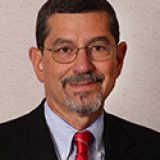Dr. David Carbone
Medical OncologistDr. David Carbone is the director of the Thoracic Center at the Ohio State University Medical Center. He has been a leading investigator on many research studies involving lung cancer and mesothelioma.

-
Ohio State University Comprehensive Cancer Center Columbus, Ohio (OH)
David Carbone has spent more than 25 years working on lung cancer research, always looking for steps toward earlier diagnosis, better therapy, more effective treatment options, riding the highs and lows of each discovery or setback.
Never has he seen this kind of progress.
“I think everyone agrees that [in] the last few years, there has been a complete revolution in the management of these patients. We’ve moved from hopelessness and palliation to major scientific breakthroughs that result in targeted intervention that can make a huge difference in cancer patients’ lives, taking them from highly symptomatic, to nearly back to normal,” Carbone said. “This is an exciting time.”
Carbone, a world renowned lung cancer expert, is now director of the thoracic center at the Ohio State University Medical Center, leading a program that will bring together scientists and physicians to develop new and targeted approaches to treating the disease.
He formerly served as the director of the Experimental Therapeutics Program at the Vanderbilt-Ingram Cancer Center, where was the principal investigator for the Specialized Program of Research Excellence (SPORE) in Lung Cancer.
“As a lung cancer specialist, I’m determined to make a difference in the field by training other physicians, doing research and caring for patients,” he said upon his appointment at Ohio State. “By taking a team approach, and combining research with optimal clinical care, we can improve the lives of our patients.”
The molecular genetics of lung cancer is one of his areas of expertise. By better understanding specific genetic markers, scientists can develop drugs that target the specific tumor cells.
In 2021, The International Association for the Study of Lung Cancer named David Carbone, MD, PhD, as the 2021 recipient of the Paul A. Bunn, Jr. Scientific Award. The award was presented at the IASLC 2021 World Conference on Lung Cancer.
Carbone also has a keen interest in malignant pleural mesothelioma, a much rarer cancer that involves the lining of the lungs.

Research and Training
Carbone was a major factor in Vanderbilt-Ingram Cancer Center getting the five-year, $12 million renewal grant from the National Cancer Institute (NCI) to continue translational research. Ingram is one of just six centers in the country to receive that SPORE program.
Carbone’s history with the NCI goes back many years, from the medical oncology fellowship he did at the headquarters in Bethesda, Maryland, in the late ’80s. The continuous funding started early in his professional career. He has served on several NCI grant review panels through the years. He is currently on the Board of Scientific Counselors for the NCI. He also is Chairman of the Lung Biology subcommittee for the Eastern Cooperative Oncology Group.
What we’re trying to accomplish is to make an impact on the No. 1 cancer killer in the United States, and to overcome the 15 percent long-term survival stigma of hopelessness that is attached to lung cancer. We want to make sure our findings are available to all cancer patients, and to help clinicians and scientists work closely to discover new targets and therapies.Dr. CarboneProfessor, Division of Medical Oncology
He was recruited to Vanderbilt in 1996 from the Southwestern Medical Centers at the University of Texas, playing a key role in the rise to prominence of the Ingram Cancer Center and the start of the SPORE program at Vanderbilt in 2001.
One of his key research efforts has been molecular profiling of different lung cancers. He has been especially attentive to the often-misguided belief that only smokers are susceptible to lung cancer, which is diagnosed in more than 200,000 Americans each year, including an estimated 20,000 non-smokers.
“There is a feeling, it’s a self-inflicted cancer, which his incredibly unfair since cigarettes are legal and highly addictive, and especially unfair to [people] who take care of themselves, never smoke and get lung cancer anyway,” he explained. “Our hope is bringing together the scientists in the lab with the clinicians who work with patients, and see what makes this disease tick.”





